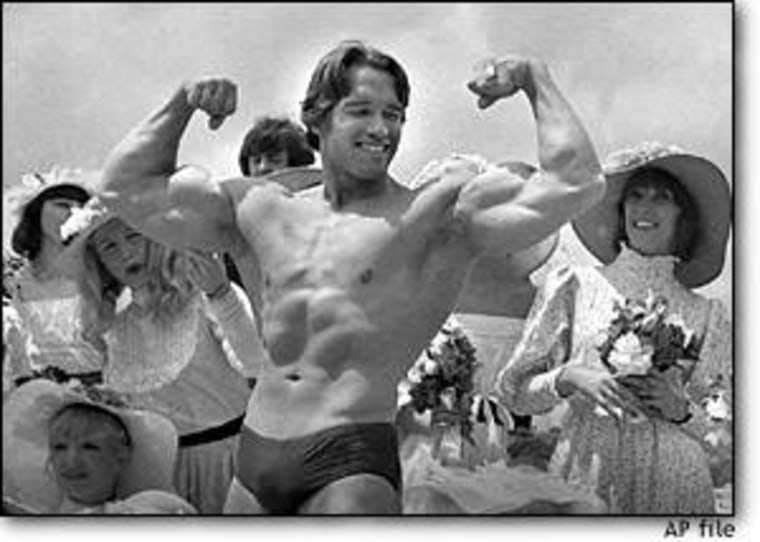It’s almost time for Californians to decide whether or not to keep Gray Davis as their governor and the battle is narrowing down to a challenge between Davis and Arnold Schwarzenegger. But Schwarzenegger has an ethical problem that makes him unfit to serve, an issue that has stared his supporters in the face ever since he first took off his shirt.
No, it's not the fact that Schwarzenegger made his fortune selling violence on the silver screen that makes him unfit for office. Or his numerous, well-documented sexual escapades.
In my opinion, the baggage weighing down the Hollywood he-man is that for many years he used steroids — drugs that are illegal in the United States today. And those who normally yell the loudest about drug use in America have kept mum because the former Conan the Barbarian represents their best shot to regain political power in the nation’s most populous state.
For most of his life, Schwarzenegger has been either a bodybuilder or an actor. In both occupations, his sole talent has arguably been his big muscles. And the only way he came to have the massive form that made him famous was through the use of steroids.
There is probably not a doctor or athletic trainer in the country who believes you can look like Schwarzenegger without a chemical boost. His earlier use of these drugs inspired — and continues to inspire — lots of young men to risk their lives by emulating what he did.
Does anybody really think that the mass and size Schwarzenegger was famous for in his movies were simply the products of a good diet and hard work in the gym? Not a chance.
Conservatives turn a blind eye
Yet conservatives, who are quick to scream for a harsh jail sentence whenever an NBA airhead is arrested for drug possession, are touting Schwarzenegger as the best man to lead the nation’s biggest state.
Furthermore, neoconservatives, such as William Kristol, Francis Fukuyama and Charles Krauthammer, who have been frothing at the mouth in op-eds and magazine articles about the immorality of using new biological techniques to redesign our bodies, have had nothing to say about the pharmacologically enhanced Schwarzenegger.
Keep in mind that the health consequences of steroid use are not trivial. Liver tumors, cancer, hypertension, torn tendons and sterility are strongly associated with the use of these drugs.
As the U.S. Customs Service says on its Web site, “Steroids are like any other illegal drug that threatens the American public — like all illegal narcotics their sale and possession represent critical links in a larger criminal process, one that funds terrorism, death and addiction around the world.”
And as the National Institute on Drug Abuse notes on its Web site, some of the greatest abusers of steroids are junior-high and high-school students who are using these drugs at rates 50 percent higher than they were 10 years ago. And who might these kids, now desperate to bulk up their bodies, have been watching on TV and in the movies for the past 25 years?
A lot of the folks supporting Schwarzenegger for governor had no doubt that the White House was no place for a philanderer who lied about his sexual behavior. I agree. But these same people ought to check their moral compasses and conclude that the governor’s office in Sacramento is no place for a drug user.
Arthur Caplan, Ph.D., is director of the Center for Bioethics at the University of Pennsylvania in Philadelphia.
